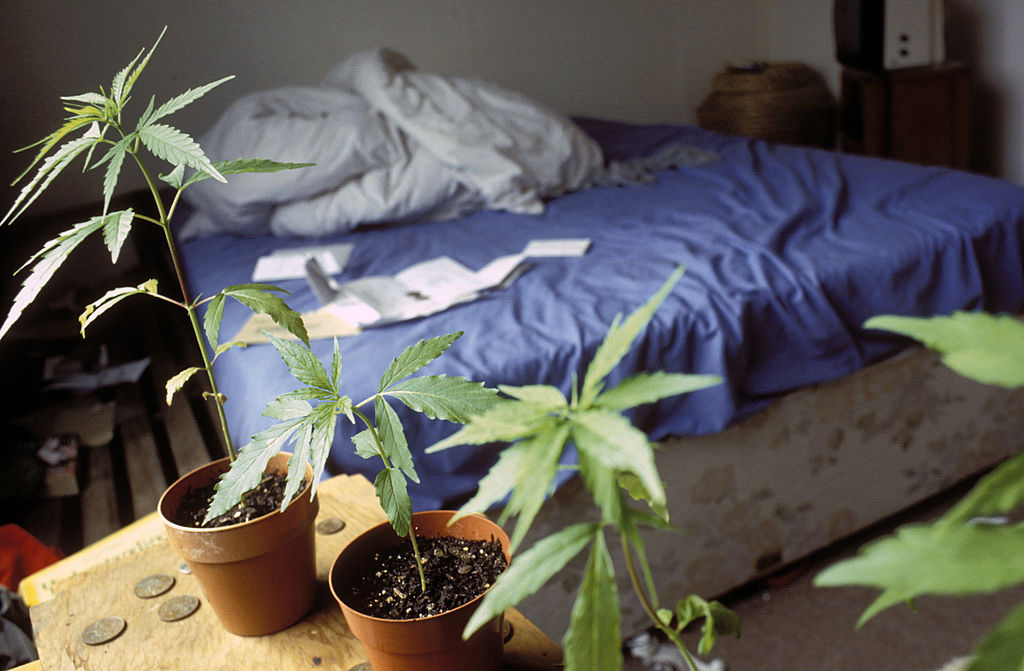NASA has, in the past, paid people to stay in bed for months at a time. (They explain why here, saying that “bed rest studies often attract people looking for a change who can afford to retreat from everyday life for a few months.”)

It sounds relaxing, up to a point, but as Politifact points out, “Boredom is a constant problem … Scientists continually poke and prod them, taking readings and measurements on everything from weight to bone density. Volunteers are told when and what to eat, and have to do everything in bed.”
Volunteers might, after a few hours, hope for something to take the edge off — would the hovering scientists allow a joint? Or three? What if you could spend all 70 days of the study — poking, prodding, monotonous food and all — completely baked?
Needless to say, this is wishful thinking (the Associated Press called NASA, just to make sure.)
But it’s an idea that has lasting appeal, judging from the number of times a fake news story asserting otherwise has surfaced.
It’s hard to tell, but the first appearance seems to have been in March of 2016 at the now-defunct healthcuresenter.com site (‘NASA will pay you 18000 USD to stay in bed and smoke weed for 70 straight days‘), from which it was picked up by indiatimes.com (not to be confused with the Times of India).
Since then it has surfaced and resurfaced at least six further times (1, 2, 3, 4, 5, 6).
- Life in the forest: How Stanley Park’s longest resident survived a changing landscape
- ‘Love at first sight’: Snow leopard at Toronto Zoo pregnant for 1st time
- Carbon rebate labelling in bank deposits fuelling confusion, minister says
- Buzz kill? Gen Z less interested in coffee than older Canadians, survey shows
(This account of what it’s like to be in a NASA bed rest experiment should dispel any idea that it’s easy money.)
READ: Russian cyberattacks targeted 39 countries and combined hacking, forgery, disinformation: report
In fake news news:
- Facebook could be much more transparent about how fake news spreads on its network, and the role that fake accounts play in it, two academics argue in the Washington Post. “It is incredibly hard to study the impact of fake news and algorithms on public life,”they complain.” Facebook’s refusal to collaborate with scientists and share data has made it difficult to know how many voters are affected or where … election interference comes from.”
- And Facebook is still hoping that technical fixes, rather than detail-oriented work by humans, can fix its fake news problem, Buzzfeed reports.
- Maclean’s profiles Jack Posobiec, Rebel Media’s man in Washington. “Though Posobiec reports for a Canadian company, there’s no Canadian perspective on his America-First work,” Jason Markusoff writes. “Canadian eyeballs aren’t really what Levant’s after anymore, or what he’s getting. Canadians now make up less than 30 per cent of his website’s viewership.”
- Conservative columnist Michael Gerson looks at the fever-swamp conspiracy theories around the 2016 death of Seth Rich, who worked for the Democratic National Committee, and concludes that the (conservative ) ” … movement has been seized by a kind of discrediting madness, in which conspiracy delusions figure prominently. They have allowed political polarization to reach their hearts, and harden them. They have allowed polarization to dominate their minds, and empty them.”
- Twitter has restricted, but not completely shut down, a fake account posting as Sleeping Giants Canada, an organization that alerts mainstream brands when their ads appear on the Rebel, which generally they don’t know about until it’s pointed out, given the way digital ad space is sold. Canadaland explains.
- The Guardian has a copy of the Facebook moderators’ manual — unsurprisingly, it covers some dark territory, among them, a three-point checklist for evaluating revenge porn. (Facebook was widely ridiculed in 2016 for censoring an iconic photo of a child fleeing a napalm attack during the Vietnam War, but he rules have been updated since then.)
- There were hopes that digital culture would birth a new breed of ‘citizen journalists,’ and for a time that seemed to be happening, writes Buzzfeed’s Charlie Warzel. But in recent years trolls have taken over, people for whom ” … ethics are secondary concerns and reputation is rarely in jeopardy, thanks to the protective veil of online anonymity. Victory often goes to the actor most willing to do harm, to be wrong, or both.” Warzel laments ” … how starkly the promise of citizen journalism has changed from the hope that more eyes will mean more accountability and better news … to the reality that information has never been freer or more fully weaponized.”
- Vox looks at a Norwegian effort to teach students to tell fake health news from real.
- The Center for Investigative Reporting’s Reveal newsletter looks at GoDaddy’s decision to continue offering domain name registration to the neo-Nazi Daily Stormer site, which it calls “a prominent player in the online white supremacist ecosystem.”
- And I’m wondering if fake tweets, obviously fake because overlong and not supposed to be mistaken for the real thing, are becoming a genre. (We’ve written about tweet-faking in the past.)
https://twitter.com/boring_as_heck/status/866319785415462913/photo/1


Comments